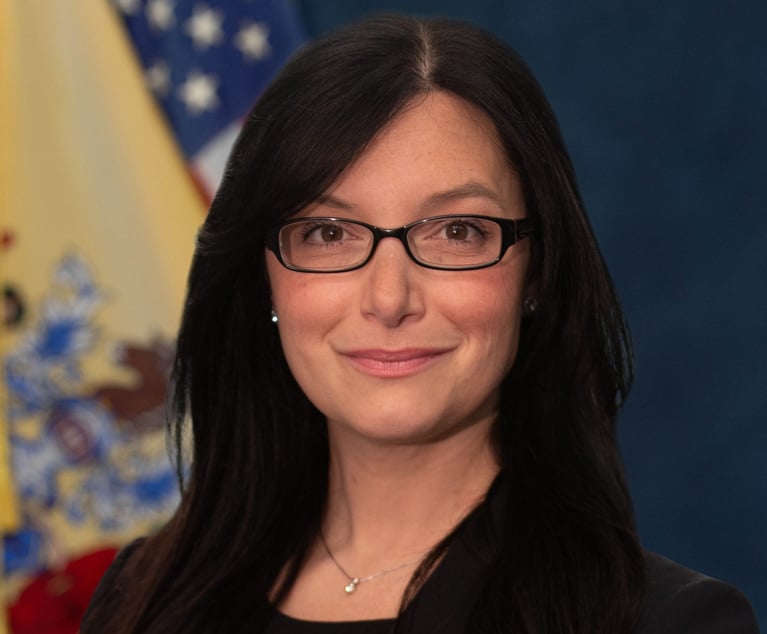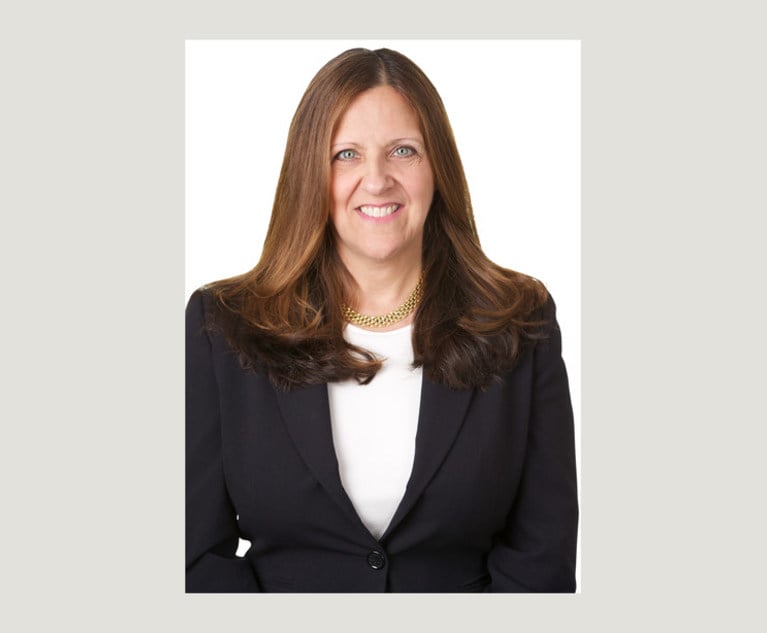 Roy Wepner of Lerner David Littenberg Krumholz & Mentlik – Photo by Carmen Natale/ALM
Roy Wepner of Lerner David Littenberg Krumholz & Mentlik – Photo by Carmen Natale/ALMWepner of Lerner David Highlights Important Behind-the-Scenes Work of Patent Practice
"There may be some lawyers out there who can do everything necessary to serve a client. But I've never met one."
June 10, 2019 at 05:49 PM
4 minute read
Roy Wepner is a partner at Lerner David Littenberg Krumholz & Mentlik, where he has practiced since 1981. Over the years that followed, Wepner “has written hundreds of exceptionally hard-hitting and persuasive briefs,” according to a colleague, who noted Wepner's ability to step into cases in which he wasn't previously involved and distill down the important issues to masterful writing—and his frequent wish to have his name left off of such briefs in favor of lead counsel. Wepner also has helped build the firm's IP litigation practice.
Law practice is often a team endeavor. What has been your experience with teamwork in the law?
There may be some lawyers out there who can do everything necessary to serve a client. But I've never met one. In litigation, many different skills are needed to cover all the bases and avoid all the pitfalls. Sometimes all you need is a reality check on an argument you've fallen in love with. Much as we might hate to admit it, a colleague may well know things that we never thought about. And we should remember that valuable help can come not only from your peers and those senior to you, but also from junior attorneys.
What types of work done at law firms and other organizations are commonly underappreciated?
In the patent field, litigators get lots of kudos (so long as they win!). But those who skillfully prepare and strategically prosecute rock solid patents are the ones that make enforcement possible. In litigation, those who can deliver a compelling oral argument rightly deserve plaudits. But so do the colleagues who prepare the arguing attorney and expose potential weaknesses in your case, in prep sessions that can be more grueling than the actual argument. A compelling summary of argument in a brief, authored by lead counsel, might be memorable. Far less visible is the hard work necessary to put together an entire brief, including a statement of facts that makes the desired outcome seem inevitable.
And no folks are more underappreciated than office staff. Your brilliant motion papers may never make it to the judge without a trusted paralegal who can navigate the quirks of electronic filing, and who has contacts at the ECF help desk on speed dial for when the system refuses to cooperate.
What can professional groups, legal publications and others do to better shed light on lawyers and law practices doing important work that's under the radar?
Not to be glib, but to “unsung heroes,” you're already “singing” our “song”! Thank you. Please keep it up, and share the idea with your sister publications.
In IP litigation, much important work is done far below the “radar” by highly competent junior attorneys. A number of federal judges have recently instituted practices whereby they will hear oral argument on motions and other matters that they would otherwise decide on the papers if the parties commit to allowing a junior attorney to deliver the argument. I look forward to seeing how this works out.
What must firms do to ensure that lawyers remain engaged with pro bono work, their communities and their families?
This is an area in which “one size fits all” ends up not fitting anyone. Firms should be flexible in these areas, recognizing the unique needs and priorities of each lawyer, and celebrating their unique contributions.
How are the business and profession of law changing, and are New Jersey lawyers well-positioned for the future?
Change, of course, has always been a constant in the legal profession. In my view, what will always stand New Jersey lawyers in good stead is the longstanding tradition of collegiality among the bench and bar. Compared to the legal communities in some other areas, where—as here—the practice of law is sophisticated and hectic, the cordiality and mutual respect that New Jersey lawyers routinely show toward each other is truly gratifying.
This content has been archived. It is available through our partners, LexisNexis® and Bloomberg Law.
To view this content, please continue to their sites.
Not a Lexis Subscriber?
Subscribe Now
Not a Bloomberg Law Subscriber?
Subscribe Now
NOT FOR REPRINT
© 2024 ALM Global, LLC, All Rights Reserved. Request academic re-use from www.copyright.com. All other uses, submit a request to [email protected]. For more information visit Asset & Logo Licensing.
You Might Like
View All
For Lawyers, the 'Work' of Making an Impact Does Not Have to Happen in a Courtroom. Laura E. Sedlak Says

Doing the Right Thing in the Pursuit of Justice Requires Guts, Says Lyndsay Ruotolo

One Can be Most Impactful When Their Pursuits Are Driven by Their Concerns and Passions, Says Sherilyn Pastor

As a Lawyer, You Have a Powerful Way to Make an Impact, Says Mary Frances Palisano
Trending Stories
Who Got The Work
Michael G. Bongiorno, Andrew Scott Dulberg and Elizabeth E. Driscoll from Wilmer Cutler Pickering Hale and Dorr have stepped in to represent Symbotic Inc., an A.I.-enabled technology platform that focuses on increasing supply chain efficiency, and other defendants in a pending shareholder derivative lawsuit. The case, filed Oct. 2 in Massachusetts District Court by the Brown Law Firm on behalf of Stephen Austen, accuses certain officers and directors of misleading investors in regard to Symbotic's potential for margin growth by failing to disclose that the company was not equipped to timely deploy its systems or manage expenses through project delays. The case, assigned to U.S. District Judge Nathaniel M. Gorton, is 1:24-cv-12522, Austen v. Cohen et al.
Who Got The Work
Edmund Polubinski and Marie Killmond of Davis Polk & Wardwell have entered appearances for data platform software development company MongoDB and other defendants in a pending shareholder derivative lawsuit. The action, filed Oct. 7 in New York Southern District Court by the Brown Law Firm, accuses the company's directors and/or officers of falsely expressing confidence in the company’s restructuring of its sales incentive plan and downplaying the severity of decreases in its upfront commitments. The case is 1:24-cv-07594, Roy v. Ittycheria et al.
Who Got The Work
Amy O. Bruchs and Kurt F. Ellison of Michael Best & Friedrich have entered appearances for Epic Systems Corp. in a pending employment discrimination lawsuit. The suit was filed Sept. 7 in Wisconsin Western District Court by Levine Eisberner LLC and Siri & Glimstad on behalf of a project manager who claims that he was wrongfully terminated after applying for a religious exemption to the defendant's COVID-19 vaccine mandate. The case, assigned to U.S. Magistrate Judge Anita Marie Boor, is 3:24-cv-00630, Secker, Nathan v. Epic Systems Corporation.
Who Got The Work
David X. Sullivan, Thomas J. Finn and Gregory A. Hall from McCarter & English have entered appearances for Sunrun Installation Services in a pending civil rights lawsuit. The complaint was filed Sept. 4 in Connecticut District Court by attorney Robert M. Berke on behalf of former employee George Edward Steins, who was arrested and charged with employing an unregistered home improvement salesperson. The complaint alleges that had Sunrun informed the Connecticut Department of Consumer Protection that the plaintiff's employment had ended in 2017 and that he no longer held Sunrun's home improvement contractor license, he would not have been hit with charges, which were dismissed in May 2024. The case, assigned to U.S. District Judge Jeffrey A. Meyer, is 3:24-cv-01423, Steins v. Sunrun, Inc. et al.
Who Got The Work
Greenberg Traurig shareholder Joshua L. Raskin has entered an appearance for boohoo.com UK Ltd. in a pending patent infringement lawsuit. The suit, filed Sept. 3 in Texas Eastern District Court by Rozier Hardt McDonough on behalf of Alto Dynamics, asserts five patents related to an online shopping platform. The case, assigned to U.S. District Judge Rodney Gilstrap, is 2:24-cv-00719, Alto Dynamics, LLC v. boohoo.com UK Limited.
Featured Firms
Law Offices of Gary Martin Hays & Associates, P.C.
(470) 294-1674
Law Offices of Mark E. Salomone
(857) 444-6468
Smith & Hassler
(713) 739-1250






